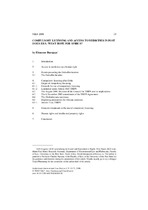| dc.description.abstract | The Trade Related Aspects of Intellectual Property Rights (TRIPS) Agreement of 1994, an outcome of the Uruguay Round negotiations, radically altered the role of international trade law in promoting and enforcing intellectual property protection around the globe. This important, yet controversial, international agreement requires members of the World Trade Organization (WTO) to implement strong intellectual property protections in their domestic law. Indeed the emergence of the TRIPS Agreement at the end of deliberations in Marrakesh has been described as a major tactical victory for rich countries and pharmaceutical companies. Prior to 1994, countries of the world were not obligated to grant patent rights for pharmaceutical products, but with the signing of the TRIPS Agreement this changed. Along with this change, patent protection for pharmaceuticals, and the impact such patent protection is likely to have
on access to medicines for the world’s poor, have become a major source of conflict between rich and poor nations. | en_US |

